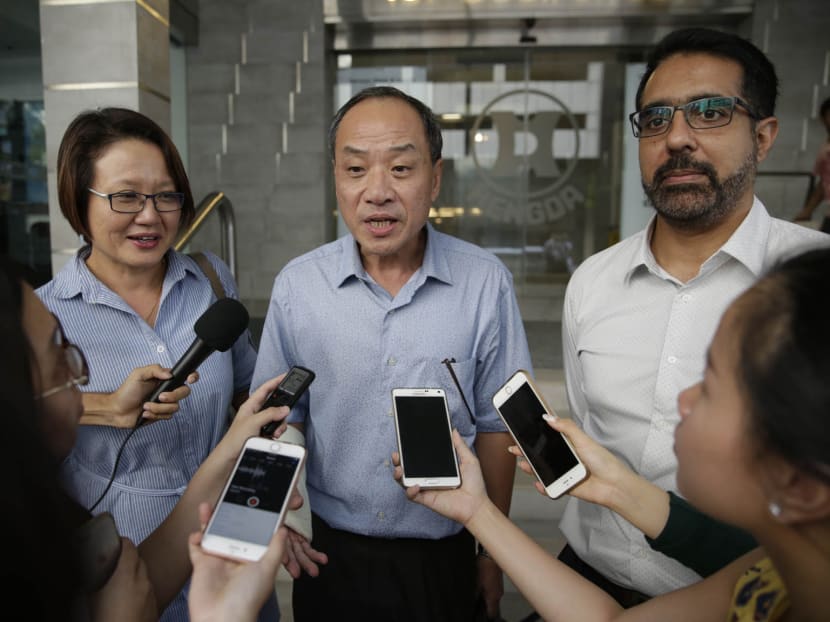WP leadership tussle ‘brewing since 2014’
SINGAPORE — The unhappiness that has been brewing within the Workers’ Party (WP) for many years — mainly due to an “autocratic” leadership style and an increasingly homogenous cadre membership — appears to be the chief trigger that led to an unprecedented challenge to party chief Low Thia Khiang during its biennial Central Executive Council (CEC) elections on Sunday (May 29).

(From left to right) Workers' Party Chairman Sylvia Lim, Secretary-General Low Thia Khiang, and Member of Parliament Pritam Singh speak to the media after the party's Central Executive Committee elections meeting on May 29, 2016. Photo: Wee Teck Hian/TODAY
SINGAPORE — The unhappiness that has been brewing within the Workers’ Party (WP) for many years — mainly due to an “autocratic” leadership style and an increasingly homogenous cadre membership — appears to be the chief trigger that led to an unprecedented challenge to party chief Low Thia Khiang during its biennial Central Executive Council (CEC) elections on Sunday (May 29).
According to party members and activists TODAY spoke to, plans to contest the secretary-general post, which has been held by Mr Low for 15 years, had been developed as early as 2014, but were later aborted.
While Mr Low, 59, dismissed talk about internal rifts as “speculation”, the WP members — who asked to remain anonymous so as not to be subject to “party discipline” — said the challenge mounted by Mr Chen Show Mao, fellow Member of Parliament for Aljunied GRC, made it plain that some members wanted to see major changes in the way the party is run.
TODAY understands that several veteran cadres had urged Mr Chen, 55, to enter the fray as he is believed to be most senior CEC member who advocates a more “consultative and inclusive” approach in running the party.
Mr Chen was nominated for the post by the WP’s former deputy treasurer L Somasundaram, 53, and Dr John Yam, 54, both of whom lost their CEC seats in the party elections.
Although Mr Low retained his post, some party members said the fact that Mr Chen managed to secure more than two-fifths of the votes — 45 out of 106 — would provide the impetus needed for Mr Low to address the concerns that WP members have.
Among other issues that saw some members throw their support behind Mr Chen included the corporate governance woes surrounding the former Aljunied-Hougang-Punggol East Town Council — which party sources said threw up heated debates during the CEC’s four-hour meeting on Sunday — and a “lack of transparency” on how individuals were appointed as cadre members and selected as election candidates.
One former member said some also felt that Mr Low and party chairman Sylvia Lim should take responsibility for the setback the WP suffered in the General Election (GE) last September.
“Obviously, there are reformists trying to steer the party away from an autocratic leadership style … We hope what Mr Chen did would provide a psychological impact for cadre members to keep an independent mind,” said a member who has been with the WP for over 10 years.
Members in the “reformist camp” aspire towards a more inclusive leadership that accommodates different ideas and feedback, he added.
“This is important if we want to speak for the diverse community of Singaporeans,” he said.
Such a vision is at odds with Mr Low’s strong hold on the party, which some WP members said mirrors the late Mr Lee Kuan Yew’s leadership of the ruling People’s Action Party.
“(Mr Low) prefers very young people who can obediently toe his line and do his bidding. Those who think out of the box and stand tall with him are sidelined,” one member told TODAY.
Anyone who suggests reforms will be “punished”, he said, citing how certain veterans were not selected as candidates for last year’s GE.
In contrast, Mr Chen is seen as one who welcomes criticism and “makes everyone feel like they have a stake in the party”, he said.
Some party activists in the dissenting camp also feel that the newly minted CEC and present slate of cadres reflect a professional bias.
“There is a disproportionate number of members in elite professions, like lawyers and academics, which is not representative of society,” one of them said.
Twenty-eight out of 36 nominees were appointed new cadres during the previous CEC’s meeting in April. Cadres have the right to elect the CEC’s members.
While the party had introduced a slate of younger candidates in the September polls, in what Mr Low and Ms Lim had repeatedly touted as “leadership renewal”, dissenters described such mantra as mere rhetoric. “This is just the leadership’s way of keeping the ‘yes men’ and ‘yes women’ while sidelining the rest,” one member said.
While the internal rifts have driven some out of the WP, others in the “reformist camp” said they hope to remain in the party and see through the changes.
What happened on Sunday should prompt the party leadership to review its approach before the next GE, members said. “The secretary-general will have to take note of the reformists’ agenda, that they are a considerable force not to be taken lightly,” one member said.
The WP did not respond when asked to comment on what some of the party members had shared with TODAY.






